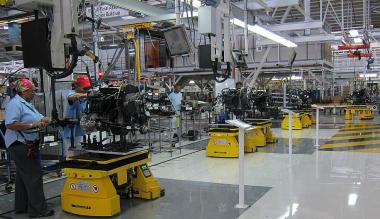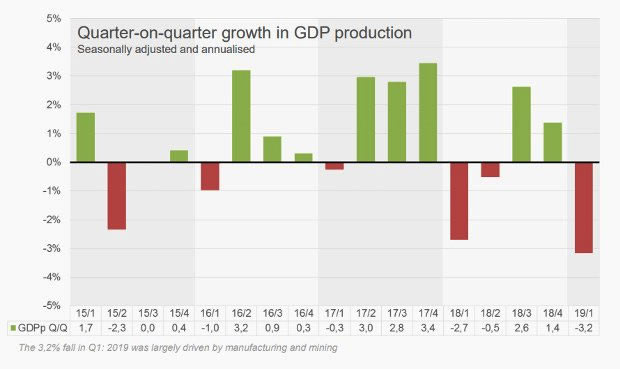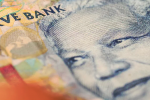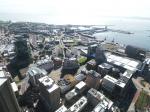SA economy slows as growth dips to 3.2%
 South Africa's real Gross Domestic Product (GDP) declined by 3.2%. The manufacturing sector contributed most to the quarterly contraction, falling 8.8%, statistician-general Risenga Maluleke said on Tuesday.
South Africa's real Gross Domestic Product (GDP) declined by 3.2%. The manufacturing sector contributed most to the quarterly contraction, falling 8.8%, statistician-general Risenga Maluleke said on Tuesday.
South Africa's real Gross Domestic Product (GDP) declined by 3.2% in the first quarter of 2019, Stats SA announced on Tuesday, showing a larger contraction than expected.
This follows growth of 1.4% in the fourth quarter of 2018. In the first quarter of 2009, the economy contracted 6.1%.
The manufacturing sector contributed most to the quarterly contraction, falling 8.8%, statistician-general Risenga Maluleke said on Tuesday.
However, activity fell in almost every sector of the economy.
"The 3.2% decline is the biggest quarterly fall in economic activity since the first quarter of 2009, when the economy – under strain from the global financial crisis – tumbled by 6.1%," said Stats SA in a statement.

While a decrease had been predicted by analysts and the SA Reserve Bank - who flagged depressed expenditure and investment in the economy, weak consumer demand, the negative impact of load shedding and recurring falls in mining production - the number still came as a shock.
“This is the biggest decline in about a decade, or since the [2008] financial crisis,” Maluleke said.
SA’s mining industry contracted 10.8% from the last three months of 2018, while final household consumption expenditure fell 0.8%.
Government spending picked up 1.3%.
The dismal GDP print underscores fears that a slowing global economy and lack of domestic business confidence has undercut SA’s expected economic recovery in 2019. The numbers are likely to reinforce expectations that the Reserve Bank will move to cut interest rates, possibly at its next meeting in July.
Load-shedding, slow wage growth and higher income taxes had all been factors economists had cited as reasons for depressed economic activity.
Exports fell 26.4% in the quarter, mainly due to exports of metals and vehicles, while imports fell 4.8%.
The agriculture, forestry and fishery sector contracted most — 13.2% — but only contributed 0.3 percentage points to the 3.2% fall. Manufacturing contributed 1.1 percentage points of this figure, and mining 0.8 percentage points.
Within the household expenditure category, clothing and footwear declined 12.7%, transport 3.1% and recreation 4%.
The rand, which was at R14.46/$ immediately before the announcement, slid to R14.64/$ shortly after 12pm, a 1.4% fall on the day.


















